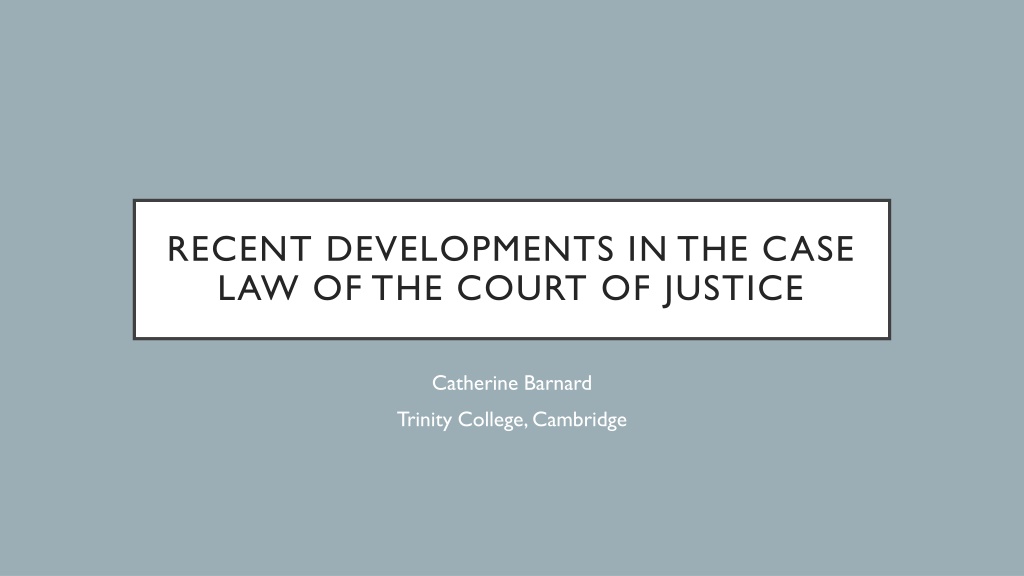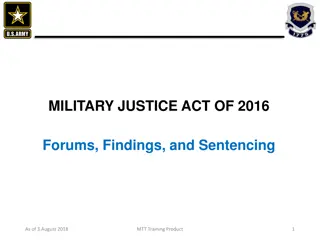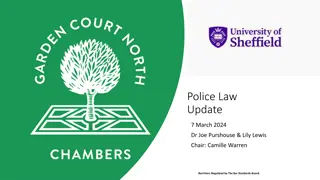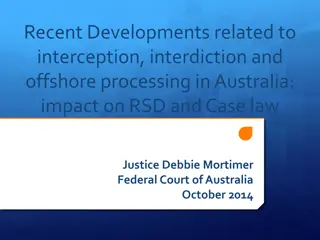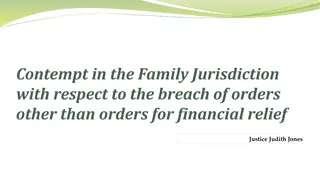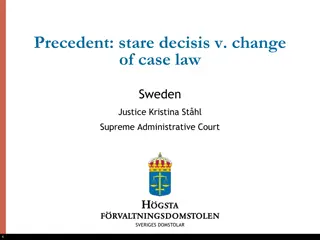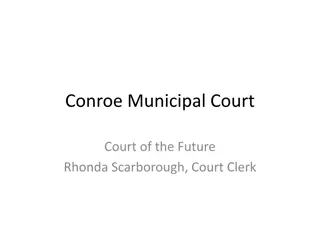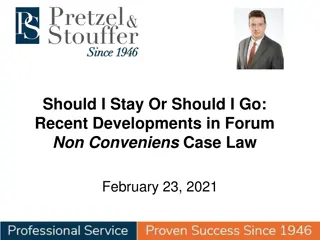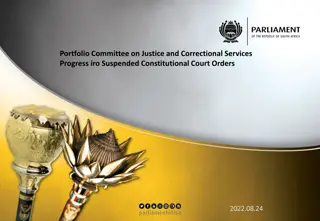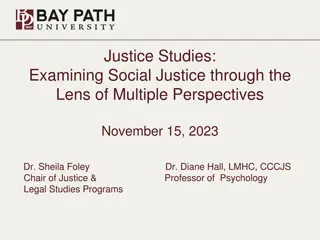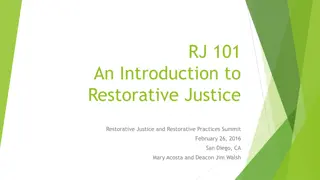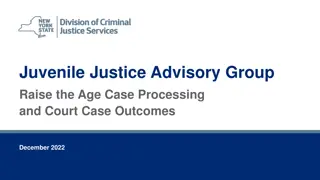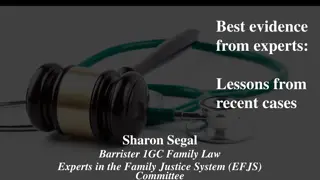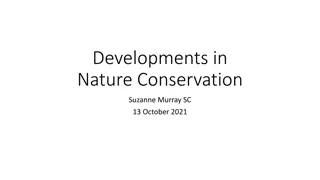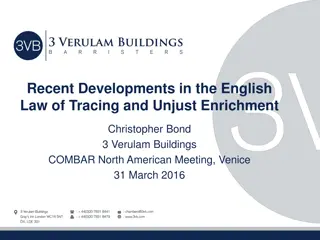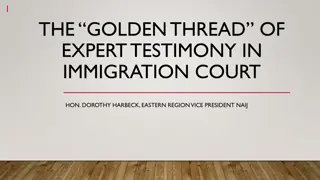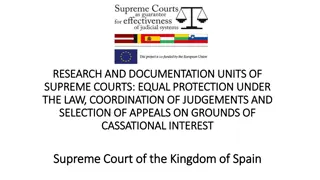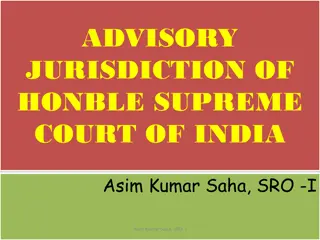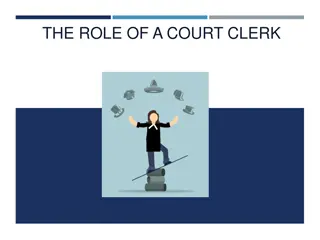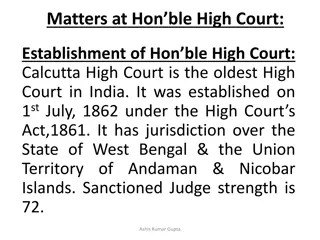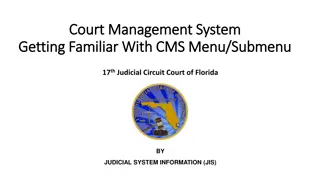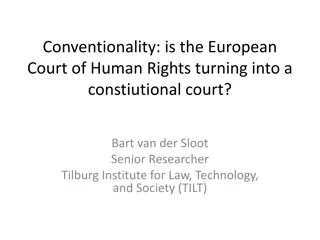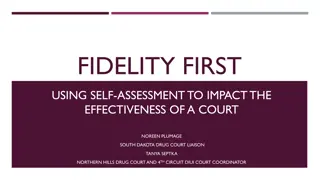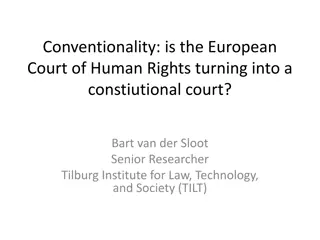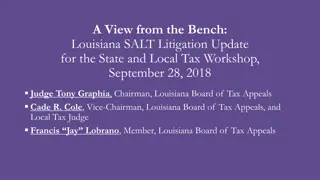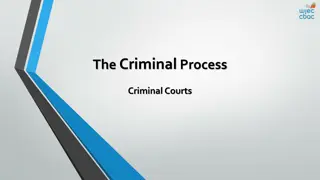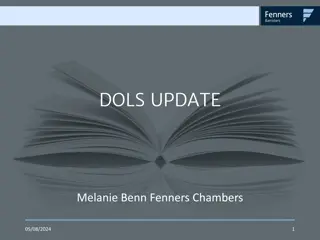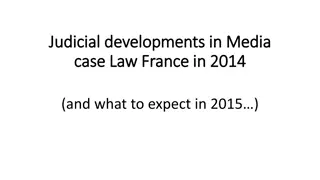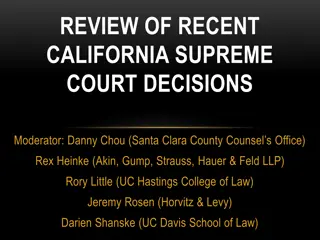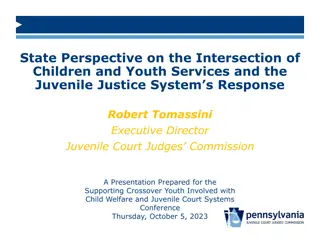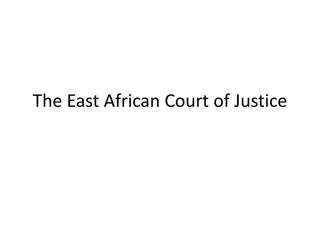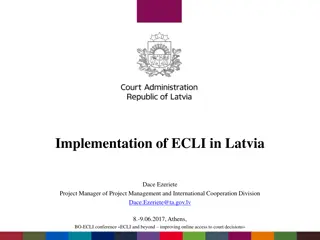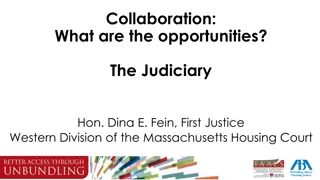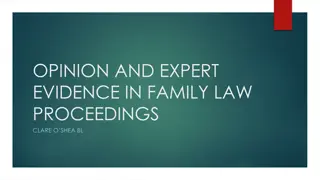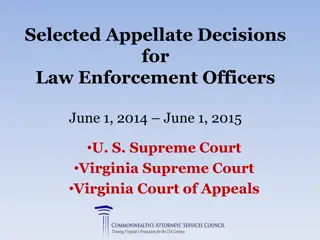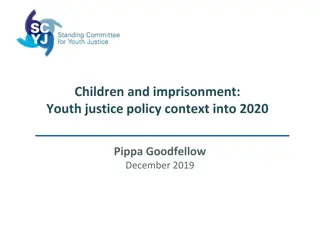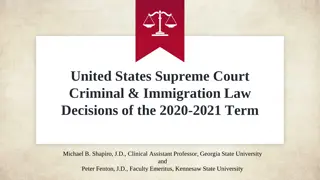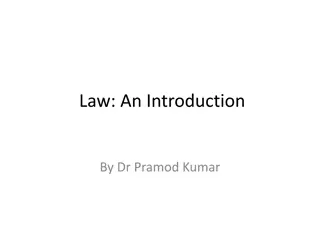Recent Developments in the Case Law of the Court of Justice
Recent developments in the case law of the Court of Justice focus on key provisions such as equal treatment, temporary agency work directive, discrimination, and working time. The directive emphasizes basic working and employment conditions, including pay and the duration of work. It also addresses issues of transfer of undertakings and exceptions for certain types of temporary agency workers.
Download Presentation

Please find below an Image/Link to download the presentation.
The content on the website is provided AS IS for your information and personal use only. It may not be sold, licensed, or shared on other websites without obtaining consent from the author. Download presentation by click this link. If you encounter any issues during the download, it is possible that the publisher has removed the file from their server.
E N D
Presentation Transcript
RECENT DEVELOPMENTS IN THE CASE LAW OF THE COURT OF JUSTICE Catherine Barnard Trinity College, Cambridge
CONTENTS Temporary Agency Work Directive Discrimination Working time Transfer of undertakings
TEMPORARY AGENCY WORK DIRECTIVE
STRUCTURE Equal treatment: basic working and employment conditions Prohibition on restrictions Personal scope Art.5(2) exception for TAW with permanent contract of employment with agency (German derogation) Art. 1 workers Art. 4 prohibition; Case C- 533/13 AKT Art. 5(3) collective agreements (Swedish derogation) Art. 5(4) where there is no erga omnes effect (UK derogation) Extended definition Art. 5(5) abuse
KEY PROVISIONS: EQUAL TREATMENT Article 5(1)The basic working and employment conditions of temporary agency workers shall be, for the duration of their assignment at a user undertaking, at least those that would apply if they had been recruited directly by that undertaking to occupy the same job. Art 3(1)(f) basic working and employment conditions means working and employment conditions laid down by legislation, regulations, administrative provisions, collective agreements and/or other binding general provisions in force in the user undertaking relating to: (i) the duration of working time, overtime, breaks, rest periods, night work, holidays and public holidays; (ii) pay.
EQUAL TREATMENT Equal treatment Art. 5(1) right Art. 5(2) contract between assignments Art. 5(4): where no erga omnes effect; different approach, incl qualifying period Art. 5(3) Collective agreements to establish different working and employment conditions Art. 5(5) abuse exception
ARTICLE 5(2) As regards pay, Member States may, after consulting the social partners, provide that an exemption be made to the principle established in paragraph 1 where temporary agency workers who have a permanent contract of employment with a temporary-work agency continue to be paid in the time between assignments.
ARTICLE 5(3) Article 5 of Directive 2008/104 1. The basic working and employment conditions of temporary agency workers shall be, for the duration of their assignment at a user undertaking, at least those that would apply if they had been recruited directly by that undertaking to occupy the same job. 3. Member States may, after consulting the social partners, give them, at the appropriate level and subject to the conditions laid down by the Member States, the option of upholding or concluding collective agreements which, while respecting the overall protection of temporary agency workers, may establish arrangements concerning the working and employment conditions of temporary agency workers which may differ from those referred to in paragraph 1. Recital 16 In order to cope in a flexible way with the diversity of labour markets and industrial relations, Member States may allow the social partners to define working and employment conditions, provided that the overall level of protection for temporary agency workers is respected.
CASE C-311/21 CM V TIMEPARTNER PERSONALMANAGEMENT GMBH Employers association Agency User Equivalent worker: Eur 13.64 CBA Eur 9.23 undertaking Trade unions individual
ECJ RULING I Article 5(3) by its reference to the concept of overall protection of temporary agency workers , does not require any account to be taken of a level of protection specific to temporary agency workers that is greater than that laid down for workers in general by provisions on basic working and employment conditions under national and EU law. However, where the social partners, by means of a collective agreement, authorise differences in treatment with regard to basic working and employment conditions to the detriment of temporary agency workers, that collective agreement must, in order to respect the overall protection of the temporary agency workers concerned, afford them advantages in terms of basic working and employment conditions which are such as to compensate for the difference in treatment they suffer.
ECJ RULING Article 5(3) means that compliance with the obligation to respect the overall protection of temporary agency workers must be assessed, in concrete terms, by comparing, for a given job, the basic working and employment conditions applicable to workers recruited directly by the user undertaking with those applicable to temporary agency workers, in order to be able to determine whether the countervailing benefits afforded in respect of those basic conditions can counterbalance the effects of the difference in treatment suffered.
ECJ RULING Article 5(3) of Directive 2008/104 must be interpreted as meaning that the obligation to respect the overall protection of temporary agency workers does not require the temporary agency worker concerned to have a permanent contract of employment with a temporary-work agency.
ECJ RULING Article 5(3) means that the national legislature is not required to lay down the conditions and criteria designed to respect the overall protection of temporary agency workers, within the meaning of that provision, where the Member State concerned gives the social partners the option of upholding or concluding collective agreements which authorise differences in treatment with regard to basic working and employment conditions to the detriment of those workers.
ECJ RULING Article 5(3) of Directive 2008/104 must be interpreted as meaning that collective agreements which authorise, under that provision, differences in treatment with regard to basic working and employment conditions to the detriment of temporary agency workers must be amenable to effective judicial review in order to determine whether the social partners have complied with their obligation to respect the overall protection of those workers.
Art. 5(2): Directive is without prejudice to measures laid down by national law which, in a democratic society, are necessary for public security, public order, prevention of criminal offences, protection of health and protection of rights and freedoms of others Measure, policy, practice OVERVIEW: THE PRINCIPLE OF NON- DISCRIMINATION IN DIR 2000/78 Direct Indirect discrimination discrimination ORs ORs Proportionate means of achieving a legitimate aim (Objective justification) General OR (Art. 4(1)) Ethos based employer OR (Art. 4(2))
CONDITIONS FOR ACCESS Art. 3(1)(a): this Directive shall apply to all persons as regards both the public and private sectors, including public bodies, in relation to: (a) Conditions for access to employment, to self-employment or to occupation, including selection criteria and recruitment conditions, , including promotion (c) Employment and working conditions, including dismissals and pay (d) membership of, and involvement in, an organisation of workers or employers including the benefits provided for by such organisations.
CASE C-587/20 LIGEBEHANDLINGSNAEVNET o Role of elected sector convenor in HKPrivat o Art 3(1)(a) covers conditions of access to any occupational activity, whatever its nature and characteristics of such activity. Those terms must be construed broadly, as is apparent from the different language versions of that provision [27] o Language of employment and occupation understood in their usual sense, not limited to posts occupied by workers as defined under Art. 45 TFEU [28] o Post of sector convenor + real and genuine professional activity(full time/monthly salary)[35]
CASE C-587/20 LIGEBEHANDLINGSNAEVNET NB some interesting points on freedom of association (FoA) Right of organisation of workers to elect freely their representatives is part of FoA under Art. 12 of the Charter which the Directive does not prejudice [42]; But FoA is not absolute and is read subject to eg the Equality Directives
CASE C-356/21 JK JK performed series of short-term contracts making videos eg trailers for TP, state owned broadcaster in PL Following a reorganisation, JK was positively evaluated to work with the new organisation and shifts were assigned to him. Three days before one of those shifts, he published a video on his Youtube channel ( Love us at Christmas time) promoting tolerance towards same sex couples Told he was not longer entitled to come in for shifts or get new shifts
CASE C-356/21 JK Self employment? NB Directive is not just about protecting the weaker party but seeks to eliminate all discriminatory obstacles to access to livelihoods and to the capacity to contribute to society through work, irrespective of the legal form in which it is provided [43] Directive applies to those activities [that] are genuine and are pursued in the context of a legal relationship characterised by a degree of stability [45]
CASE C-356/21 JK Since the activity pursued by the applicant constitutes a genuine and effective occupational, pursued on a personal and regular basis for the same recipient, enabling the applicant to earn his livelihood, in whole or in part, the question whether conditions fort access to such an activity fall withing Article 3(1)(a) of Directive 2000/78 does not depend on the classification of that activity as employment or self-employment , given that the scope of the provision of the Directive must be construed broadly . [47] Also covered by the term dismissal ( terminating the professional relationship) in Art. 3(1)(c) [63] Art. 2(5) doesn t apply Art. 16 freedom to conduct a business is not absolute but must be viewed in relation to its social function [75]
Case C157/15 Achbita Issues Case C-188/15 Bougnaoui C-804/18 IX and C-541/19 MJ ( WABE ) JUDGMENT OF THE COURT Dir covers forum internum (the fact of having a belief) and forum externum (manifestation of belief) Meaning of religion Repeated [30] Religious beliefs and philosophical or spiritual beliefs On grounds of religion; also covers discrim between religions less favourable treatment must be as a result of the R or B Direct discrimination Not an issue here: no evidence that the rule was applied differently to A as compared to any other worker [28] Question not clear May be: MJ (large conspicuous signs) Indirect discrimination May be [28] Question not clear May be: IX (policy applied neutrally)
Issues ECJ in Achbita ECJ in Bougnaoui ECJ in WABE Objective justification v Art. 4(1) Objective justification (1) Legitimate aim policy of neutrality must be considered legitimate (see also Art. 16 Charter) (2) Proportionality (a) Appropriate yes, if applied in consistent and systematic manner (b) Is provision limited to what is strictly necessary? For national court to decide but Art. 4(1): the willingness of an employer to take account of the wishes of a customer no longer to have the services of that employer provided by a worker wearing an Islamic headscarf cannot be considered a genuine and determining occupational requirement within the meaning of that provision Objective justification Policy of neutrality may be considered legitimate (see also Art. 16 Charter), provided: (i) policy meets genuine need on the part of the business; balancing with rights of others (eg Art. 14) and see if business would suffer; (ii) policy applied in consistent and systematic manner (appropriate); and (iii) limited to what is strictly necessary (ii) and (iii) carried out in such a way as to balance all competing interests/FHR
Issues Case C-344/20 LF C-804/18 IX and C-541/19 MJ ( WABE ) Meaning of religion R eligion and belief are two facets of the same single ground of discrimination [26] Religious beliefs and philosophical or spiritual beliefs On grounds of religion; also covers discrim between religions Exhaustive list of grounds in Art. 1; Dir. Does not cover political or trade union belief; nor does it cover artistic, sporting, aesthetic or other beliefs or preferences [28] less favourable treatment must be as a result of the R or B Direct discrimination Cf prohibition of wearing any visible sign of political, philosophical or religious belief ie no head covering (cap, hat or headscarf) [32]; no May be May be: MJ (large conspicuous signs) Indirect discrimination May be: IX (policy applied neutrally)
Objective justification WABE Case C-344/20 LF Objective justification WABE repeated Objective justification Policy of neutrality may be considered legitimate (see also Art. 16 Charter), provided: (i) policy meets genuine need on the part of the business; balancing with rights of others (eg Art. 14) and see if business would suffer; (ii) policy applied in consistent and systematic manner (appropriate); and (iii) limited to what is strictly necessary That interpretation is inspired by the concern to encourage, as a matter of principle, tolerance and respect, as well as acceptance of a greater degree of diversity, and to avoid abuse of a policy of neutrality established within an undertaking to the detriment of workers who observe religious precepts requiring the wearing of certain items of clothing (ii) and (iii) carried out in such a way as to balance all competing interests/FHR
AGE National Case C- 52/22 BF retirement pension national legislation providing for a gradual alignment of the pension scheme for civil servants with general pension scheme; first adjustment of the amount of the pension made more quickly for one group of civil servants than another Issue could be covered by Art. 3(1)(c) of Dir 2000/78 (cf Art. 157 TFEU) Operation of the scheme *might* be found to be indirectly discriminatory on grounds of age because linked to the number of years worked (although the Court doubted this [50-51]) Objective justification budget alone is not enough (see also Case C-650/21 FW [70-71] but objective of ensuring long term funding or retirement benefits and reducing the gap is objective justification [58] and proportionate measure/employer practice Direct or indirect discrimination OR Objective justification
CASE C-304/21 VT State commissioner police posts 18-30 Art. 4(1): possession of particular physical capacities in order to be able to perform essential duties of the police such as ensuring the protection of [people and property .. may be considered to be a GOR [47] Operational capacity and functioning of police service is a legitimate objective under Art. 4(1) But not proportionate (and derogations need to be narrowly construed) Cf fire service which requires exceptionally high physical capacities : Case C-229/08 Wolf
CASE C-192/22 FI o Worker on work phase of progressive retirement scheme (worked 1 Feb 2013 31 May 2016 and released 1 June 2016 to 30 Sept 2019) o Leave acquired (2 2/3rd days) but not taken due to fact that he was sick when he was working and could not take it; leave lapsed o Right to paid annual leave is fundamental principle of EU social law [18] o Any derogation from EU system of organising working time must be interpreted in such a way that its scope is limited [24] o Art. 7 of Dir 2003.88, read in the light of Art. 31(2) of Charter read to preclude rule of national law o See also Joined Cases C-518/20 and C-727/20 XP
REST CASE C-477/21 IH CASE C-120/21 LB national legislation is not allowed to time bar (after 3 years) the right to paid annual leave acquired by a worker in respect of a given reference period where the employer has not put the worker in the position to exercise that right. Train driver Daily rest periods under Art. 3 are different to and additional to weekly rest periods in Art. 5 If weekly rest period of 35 hours, daily rest is additional
JOINED CASES C-257/21 AND C-258/21 COCA-COLA Nightwork irregular night work paid more than regular night work Does EU law and specifically the Charter - apply? No: this is not implementing Dire 2003/88 for the purposes of Art. 51(1) nd therefore equality principles in Charter do not apply The Directive is a health and safety matter; it does not cover pay which is excluded form the Art. 153 (6) legal basis
OVERVIEW Right to I&C Recognised TU f/w elected worker reps Is there a transfer? Ordinary transfer (standard definition) (Reg 3(1)(a)) Economic entity transfer Retains its identity But NOT share sales Novation of contract (Reg 4) Novation Transfer of contract but not automatic term to apply latest CA (Reg 4A) Transfer of liabilities Variation Right to object (Regs 4(7) and (8)) Right to protection against dismissal (Reg 7) Actual dismissal Constructive Quasi constructive (Reg 4(9): where a relevant transfer involves or would involve a substantial change in working conditions to the material detriment of emp ee) Common law (Reg 4(11))
IS THERE A TRANSFER OF AN UNDERTAKING For there to be a transfer of an undertaking there needs to be (stable) identity ie functional autonomy (stable) economic entity (SEE) transfer (1) Organised grouping of resources (2) Pursues economic activity (3) central or ancillary (Reg. 3(2)) Contract eg sale, leasing, [contacting out] Spijkers formula Amatori: SEE must have a sufficient degree of functional autonomy ie powers granted to those in charge to organise the work Transfer between two companies in the same corporate group (Allen) Similarity of pre and post transfer activity (Schmidt) Unilateral decision by public authorities (Bartol) Suezen: assets and non-assets based transfer Activity is not entity Need not be the main purposes of the relevant organisation
CASE C-675/21 STRONG CHARON B takes on v small number of A s workers who also lacked specific skills; Transfer of undertaking? Service provider A Service provider B B does not take on tangible or intangible assets necessary for continuity of service. customer -> no transfer
